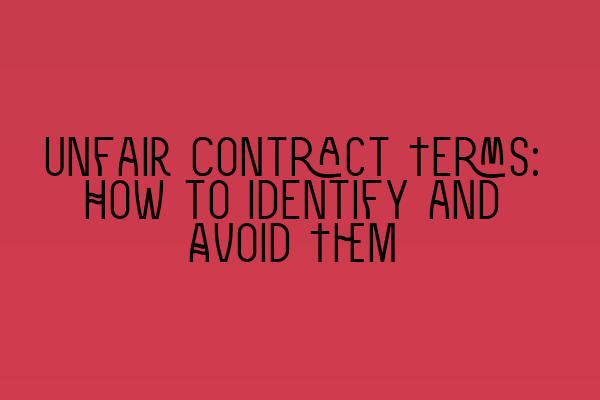Unfair Contract Terms: How to Identify and Avoid Them
Welcome to our blog at SQE Contract Law! In today’s post, we will be discussing an important topic that affects individuals and businesses alike: unfair contract terms. Understanding how to identify and avoid these terms is essential to protect your rights and interests. So, let’s dive in!
Unfair contract terms can occur in various types of agreements, including consumer contracts, employment contracts, and commercial contracts. These terms are often hidden or disguised, making it crucial to develop a keen eye for spotting them. By doing so, you can safeguard yourself from potentially unfavorable arrangements.
To help you navigate through the complexities of unfair contract terms, we have compiled a list of key indicators to watch out for:
1. Lack of Balance:
An unfair contract term often creates a significant imbalance between the parties involved. It may heavily favor one party, usually the stronger party, while placing the other party at a distinct disadvantage. Look for clauses that limit your rights excessively or grant excessive power to the other party.
2. Complexity and Ambiguity:
Unfair contract terms often use convoluted or ambiguous language. These terms might make it difficult for you to understand your obligations and the consequences of breaching the agreement. Be cautious of terms that are vague or excessively technical, as they can be used against you in the future.
3. Unexpected Termination or Renewal Clauses:
Watch out for contract terms that give the other party the unilateral right to terminate the agreement without cause or to automatically renew the contract without your consent. Such clauses can trap you in long-term commitments that are not in your best interest.
4. Exclusion or Limitation of Liability:
Unfair contract terms may seek to exclude or limit the liability of the other party for damages or losses caused by their actions or omissions. These terms can leave you without adequate recourse in case of misconduct or negligence. Review such conditions carefully and consider seeking legal advice before agreeing to them.
5. Unreasonable Penalties and Fees:
Pay attention to contract terms that impose exorbitant penalties or fees for minor breaches or terminate your rights entirely for minor infractions. Unfair contract terms seek to impose disproportionate consequences that are not in line with the nature of the breach.
6. Non-Negotiable Terms:
If a contract has terms that are presented as non-negotiable, it may indicate an imbalance of power and potential unfairness. Fair contracts typically allow for negotiations and amendments to ensure both parties’ interests are adequately addressed.
It is important to remember that unfair contract terms are not legally enforceable. Under the law, these terms can be considered unfair, and the courts have the power to strike them down. However, prevention is always better than cure, and avoiding such potentially harmful terms in the first place is crucial.
If you come across any suspicious clauses in a contract, it is advisable to consult a solicitor who specializes in contract law. They can provide you with professional guidance and ensure that your rights are protected.
In conclusion, identifying and avoiding unfair contract terms is a vital skill for individuals and businesses. By understanding the indicators of unfairness and seeking professional advice when needed, you can safeguard your interests and ensure fair contractual relationships. Stay informed, be vigilant, and protect yourself!
If you found this post helpful, you may also be interested in reading our related articles:
– Unveiling Real-Life Case Studies: Insights into Legal Practice and Decision-Making
– Exploring Solicitor Salaries in the UK: Average Earnings and Factors Affecting Income
– Mastering Client Relationship Management: Skills for Solicitors to Enhance Trust and Loyalty
– Pursuing a Law School Education in the UK: Choosing the Right Path for Your Future
– Securing Training Contracts: A Roadmap to Becoming a Solicitor
Please feel free to explore our website for more informative content on contract law and related topics. Remember, knowledge is power when it comes to contracts!
